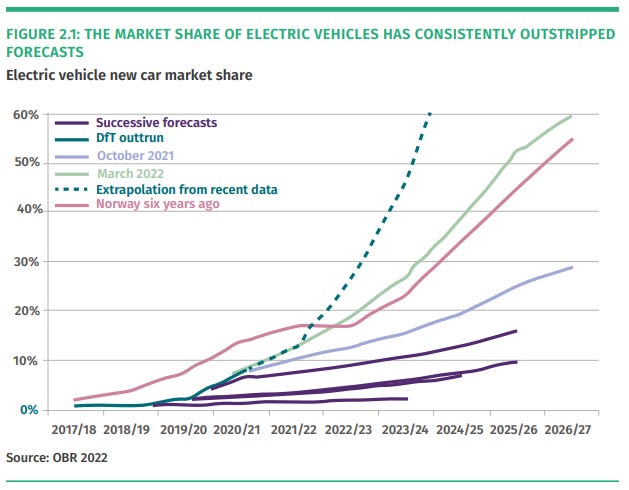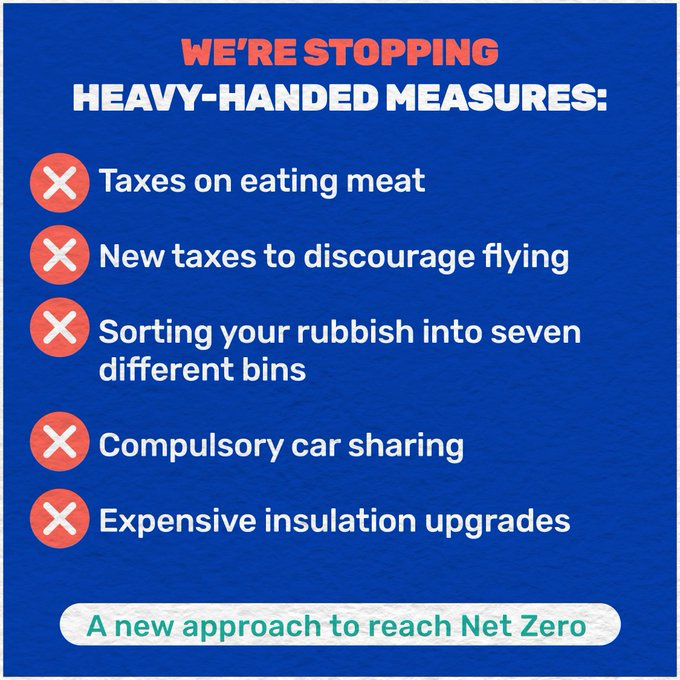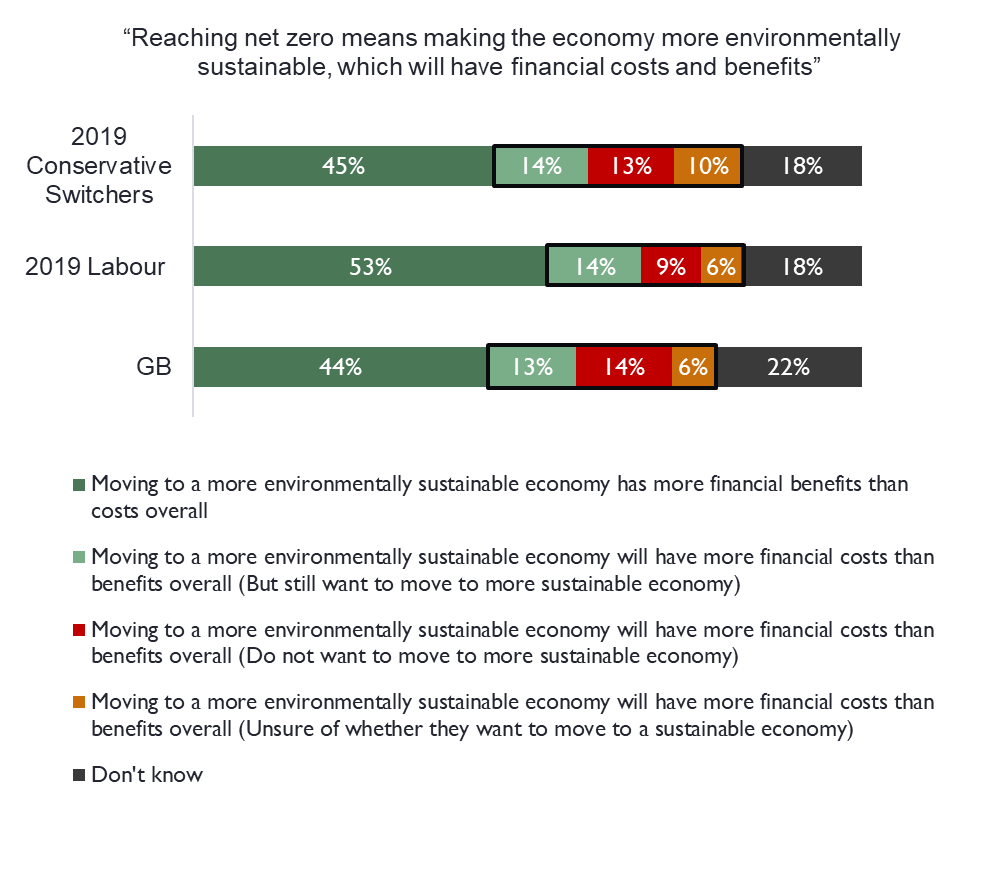I started this newsletter because I think climate and energy policy will play a big role in the next election. I’ll admit I wasn’t expecting the Prime Minister to fire the election starting gun with a major net zero announcement, but here we are.
For a lot of people working in climate, policy is deeply personal. When things change or go backwards, it hurts. Last Wednesday was heated. As my colleague Daisy Powell-Chandler said, “It is pretty impressive when they manage to annoy car manufacturers and the green lobby”. But what matters if you care about improving policy, is not the person making the change or their personal motivations, but the political and structural reasons they are doing so. With heads somewhat cooler, let's see what those are, and how they can be overcome.
The Policy
The two biggest changes come to electric vehicles and low-carbon heating.
Electric vehicles
The biggest noise came from the delay to the phase-out of new internal combustion engines from 2030 to 2035. Ford amongst others, and the automotive trade body immediately kicked off. After being repeatedly reassured the policy wasn’t changing, and having several investments riding on the 2030 date it's not hard to see why. However, the Department for Transport has confirmed that although the date is changing, the underlying zero-emissions vehicle mandate is not. While this undoubtedly will undermine investor and consumer confidence, it's not immediately clear that it will make a huge difference. Car companies know EVs are the near future, and they're accelerating on a trajectory faster than assumptions.
Low-carbon heating
The changes are far more substantial and extensive here.
The phase-out of off-grid, oil boilers has been delayed from 2026 to 2035. As a cost of living measure, this is unusual: oil is very expensive and burning it is bad for health. As Andrew points out this also is where heat pump installations are accelerating, changes could slow this down. Feels like the broadband rollout, where rural areas are left behind in a vital transition.
For gas boilers, the 2035 phase-out is now an 80% phase-out target. This will create a huge bunfight over who is exempt, and distorts incentives for the entire population to switch, hoping they’ll be in the 20% not required to.
The duty on landlords to reach EPC C by 2028 for private rented properties is gone. This is inexcusable, it costs government nothing and leaves the poorest in society without protection or agency in the face of rising bills.
The independent energy efficiency taskforce is also scrapped.
This was all balanced by an increase in the grant for heat pumps from £5000 to £7500. One can imagine this was signed off by the Treasury only if it was revenue neutral, i.e. not expected to increase demand, while the overall size of the pot for grants stayed flat (£150m py). My worry is that manufacturers and installers use this as an opportunity to increase prices.
There is, of course, all the stuff the PM ruled out that was never policy in the first place, so let's ignore those. Some of the re-announcements on the grid, like queue management, are encouraging and important. Most interesting is the spatial plan for infrastructure, a strategy for what the energy requirements of a given area area and therefore what infrastructure they’ll need to provide it, and accelerating approval of National Significant Infrastructure Projects, though with no underlying plan, I fear Sunak will run into the same political challenges on planning that Tory governments always do.
The politics
The first Election Energy set out how integral climate change is to the British Public. New polling from Public First released immediately after the speech leaked reinforces that point.
First, this isn’t likely to stem the tide of 2019 Conservative voters shifting to Labour. In fact, that group are more likely to consider the government’s current environmental policies slow (41%), insufficient (33%), and unimpressive (30%) than the public in general.
Second, although this is pitched as a measure to prevent consumers from paying burdensome costs, that’s also not where the public is. Voters in general think net zero is more economically beneficial (44%) than costly (34%). Net zero was only seen as adding to the cost of living by 14% of people, with an even smaller number seeing ditching it as a way to bring costs down.
Most plausible is that Number 10 sees this as vote consolidation. YouGov in a snap poll found the measures to be popular with around ⅔ of Tory 2019 voters, with the other third presumably those that are switching to Labour. Our polling shows that Conservative voters are more likely to support a pause on net zero plans (51%), whereas those intending to vote Labour would oppose (52%).
But more than attempting to hold a minority, it speaks to a wider attempt to create dividing lines not just with Labour but within Labour. Bar a couple of notable backbenchers, the message discipline following the speech is admirable from the government. It helps that the announcement wasn’t made in parliament so there were no awkward questions from Sunak’s own side.
Sunak needs the public to buy the new message that while government is committed to Net Zero, it wants to do it differently. But for many, this will feel like another u-turn, and could be easily caught up in a view of government missed targets and broader incompetence. Trying to claim the mantle of a long-term, sensible government is one thing, but the number one public motivator for climate action remains future generations. Explicitly tying these things together but then going in another direction is pushing against public understanding - especially when delayed targets are, for voters, another symptom of a flapping government.
Still, if Conservatives hold their message it pressures Labour to hold its own and speak to the majority. There’s a risk that Labour gets caught between several messages, a green a pleasant future, meeting climate targets, international leadership, green jobs. That could fracture its coalition, in order to keep it together it will need to stick rigidly to energy security.
It also adds significant pressure to Labour’s policy process. The party had developed a series of plans for government on the belief it was inheriting a certain baseline. Labour now needs to spend political capital deciding whether to announce it will reinstate targets, or change them entirely. That combined with the failure of offshore wind in the latest CfD auction makes 2030 net zero power for example look even more challenging.
Recommitting to the 2030 ICE phaseout makes sense, car manufacturers support it and we’ll likely hit it anyway. Clean heat has proved more contentious. The private rented sector will likely get its target back; renters vote Labour, landlords don’t. But phaseout dates are unlikely to change under a Labour government, and we aren’t expecting a plan until then. Despite having £6bn a year available for retrofit it's clear the clean-heat aspect is a challenge and an area the party needs support.
The Conservatives will also hope that for any recommitments Labour makes it can attribute new spending numbers to them, or costs it would impose on business and consumers, undermining the left’s lead on economic competence. As I’ve written before, Labour pays a real (although increasingly small) brand penalty on both tax and spend that Conservatives don’t, its certainly one way to cause doubt in those switching or returning to Labour.
Will it work?
The politics will take time to shake out. Snap YouGov polling reinforces the voter consolidation thesis, with voters split on party lines, particularly on Sunak’s motivations. I’m interested though in how this plays for Sunak. Voters are sceptical that climate targets will be hit, they see the government as incompetent and are also concerned politicians aren’t being honest about net zero. Sunak’s speech was an attempt to rise above that, but his approval ratings and trust in him to carry out green policy, indicate it will be challenging. However, a remarkable Times leader, as well as backup from the Sun and the Mail, suggest the press is happy to use this as an opportunity to support the PM and criticise Labour’s plans.
“Labour has a responsibility to reflect seriously on environmental policy ahead of a 2024 election that it is likely to win. It shows scant sign of doing so. On the contrary, it advances a “prosperity plan” that will “see the state make public investments in industries that are vital to Britain’s future success”. The likelihood that civil servants know better than the markets which technologies are economically viable is vanishingly small. Labour’s programme is a recipe for wasteful public spending.” Times Leader, 21 Sept
The move has made net zero harder to reach. While the PM is not wrong that the UK has hit all its previous carbon budgets, with room to spare. These were set deliberately low, we were in a financial crisis and we thought offshore wind was going to remain costly. That means the next carbon budgets need to play catch up. These are the ones that the CCC has already said we’re struggling to meet and potentially going backwards on. Remember: 2050 and the carbon budgets are legally binding. At the moment, the plan to reach them is incomplete, and it's likely these changes will make it harder. It's almost certain the government will be subject to a judicial review.
“Our confidence in the UK meeting its medium-term targets has decreased in the past year,” CCC Progress Report, June 2023
Sunak wanted a different approach to costs and benefits of net zero. Yet last week’s speech showed little regard for a balanced weighing of the costs and benefits of change. The downsides both to government’s electoral hopes and UK progress to net zero outweigh any potential short-term gains.
The political rational is weak. For one, few voters knew this policy existed, and still don’t after the intervention. This isn’t electoral suicide but it's not a turning of the tide either. Those currently intending to vote Conservative may be happy, but those who won’t are not. And the former is not enough to win a general election.
Its on the policy though that the damage is worst. Previous targets alone weren’t enough to support households or get to 2050, they needed an underlying strategy, one which requires significant public engagement and persuasion. But instead of using government resources to do that, they instead chose to go backwards and make it harder for the next government to make progress. As I said at the time, it feels like a literal scorched earth policy. In the long-term it will undoubtedly make the next government’s job harder, maybe Sunak is hoping it won’t be a job for him.
Takeaways
Changes to EV policy will damage perceptions and investor confidence, but changes to heating policy are a far bigger backward step.
Sunak will hope changes will sure up existing Tory voters. But the risks are high, especially for perceptions of government competence and its motivations.
A response will be a big test of Labour’s ambitions and its message discipline, but heat remains a big gap in its green plans.







